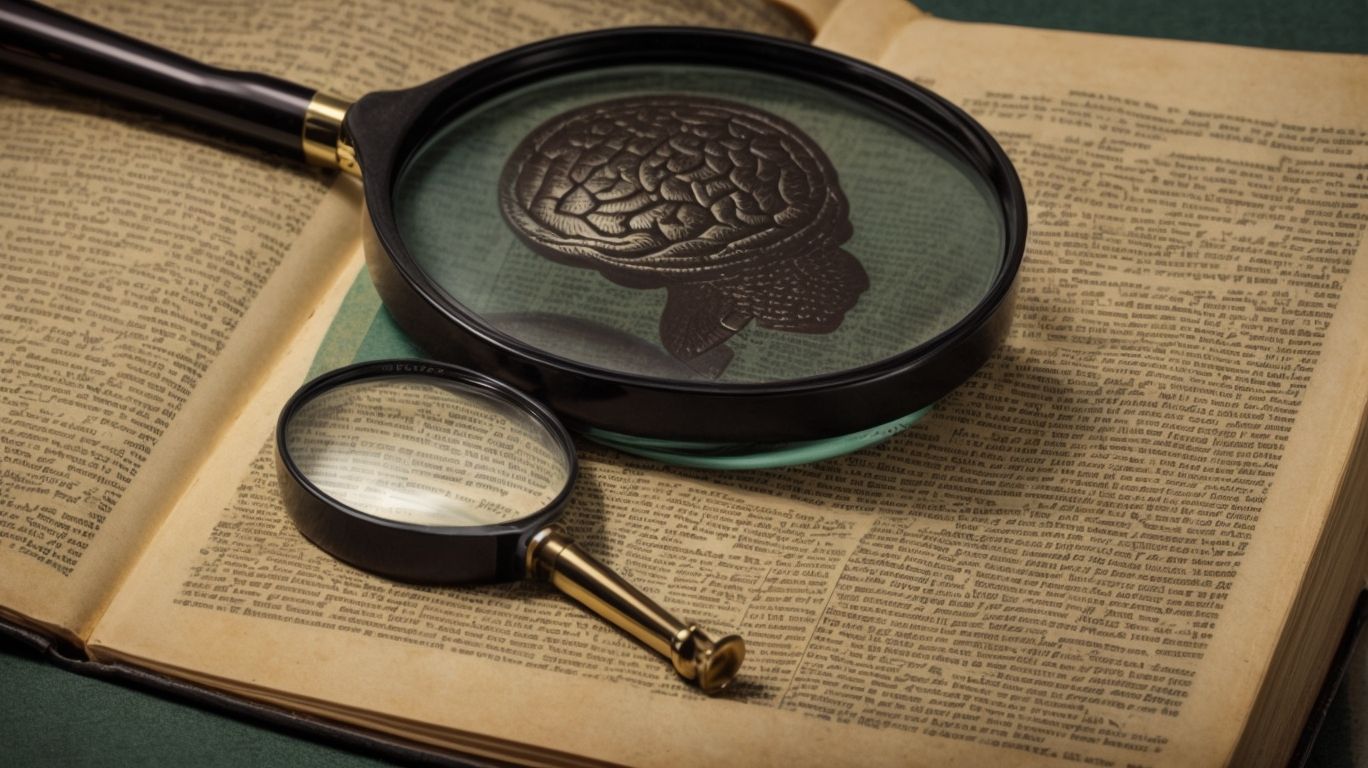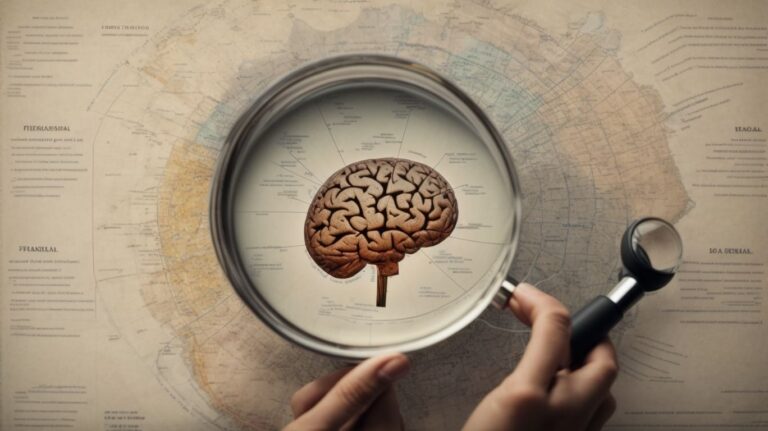Psychology is a complex and fascinating field that delves into the depths of human behavior and mental processes. In this article, we will explore the roots of psychology, from its origins in philosophy and physiology to its development as a natural science.
We will also discuss the key figures who have played pivotal roles in shaping the discipline, including Wilhelm Wundt, Sigmund Freud, William James, and Ivan Pavlov. We will examine the concept of mental activity, its different types, and the historical context and controversies surrounding it.
We will explore the impact of the statement on mental activity on the field of psychology. Join us as we unravel the intricacies of this captivating subject.
Contents
- 1 Key Takeaways:
- 2 What Is Psychology?
- 3 What Are The Roots Of Psychology?
- 4 What Are The Key Figures In The Development Of Psychology?
- 5 What Is Mental Activity?
- 6 What Is The Statement On Mental Activity?
- 7 How Has The Statement On Mental Activity Impacted Psychology?
- 8 Frequently Asked Questions
- 8.1 What is the statement on mental activity in the origins of psychology?
- 8.2 Who is considered the founder of psychology?
- 8.3 How did the study of mental activity develop over time?
- 8.4 What is the difference between structuralism and functionalism in psychology?
- 8.5 What role did Sigmund Freud play in the origins of psychology?
- 8.6 How has the statement on mental activity in psychology changed in modern times?
Key Takeaways:
- Psychology is the study of the mind and behavior, and its origins can be traced back to various disciplines such as philosophy, physiology, and natural sciences.
- The development of psychology was influenced by key figures such as Wilhelm Wundt, Sigmund Freud, William James, and Ivan Pavlov.
- The statement on mental activity is a controversial and debated topic, but has had a significant impact on the field of psychology and our understanding of the mind.
What Is Psychology?
Psychology is the scientific discipline that studies human behavior, cognition, and the human experience, encompassing theoretical perspectives, clinical practice, and empirical research.
It delves into various branches such as clinical psychology, which focuses on diagnosing and treating mental, emotional, and behavioral disorders.
Additionally, neuropsychology explores the intricate relationship between the brain, behavior, and cognitive functions.
Cognitive psychology examines mental processes like perception, memory, and problem-solving. Its relevance extends to educational psychology, understanding how individuals learn and retain information.
Social psychology explores how people’s thoughts, feelings, and behaviors are influenced by others. These diverse subfields contribute to a holistic understanding of human behavior and mental health.
What Are The Roots Of Psychology?
The roots of psychology can be traced back to its intersections with philosophy, physiology, and the natural sciences, reflecting the exploration of human consciousness, thought processes, and mental representations throughout history.
Philosophy, particularly branches such as metaphysics and epistemology, provided the early framework for understanding the workings of the mind and the nature of knowledge.
Meanwhile, the study of physiology and the natural sciences contributed to the burgeoning interest in understanding the physiological and biological underpinnings of human behavior and cognition.
This interdisciplinary approach laid the groundwork for psychology as a distinct field, with thinkers like Wilhelm Wundt and William James contributing significantly to the formalization of psychology as a science.
Their work furthered the investigation into human perception, memory, and behavior, setting the stage for the development of various psychological theories and methodologies.
Philosophy
Philosophy has significantly influenced the development of psychology, with debates on dualism, materialism, and the nature of the human mind and physiology shaping early psychological perspectives.
One of the key debates is the conflict between dualism and materialism, where dualism posits the mind and body as separate entities, while materialism argues for the interconnectedness of mind and body.
These debates have given rise to influential theories such as Descartes’ dualism and John Locke’s empiricism, which have informed the study of consciousness and perception.
Philosophical movements like structuralism and functionalism have laid the groundwork for understanding the human mind’s relationship to human physiology.
Physiology
The integration of physiology into psychology facilitated a deeper understanding of human consciousness, mental processes, and behavior, aligning with advancements in neuroscience and Darwin’s theory of evolution.
Physiology, as the study of how the body functions, has provided crucial insights into the mechanisms underlying psychological phenomena.
This includes understanding neurotransmission, hormone regulation, and the intricate network of the nervous system, which has helped elucidate how physiological processes influence emotions, cognition, and behavior.
This integration has also shed light on the impact of biological factors such as genetics, brain structure, and neurochemical imbalances on mental health disorders.
This information informs therapeutic approaches and highlights the evolutionary roots of human behavior. Our physiological makeup has been shaped by evolutionary pressures, influencing our psychological tendencies and responses.
Natural Sciences
The natural sciences have shaped psychological inquiry by exploring the unconscious mind, gathering empirical data within controlled experimental conditions, and understanding environmental influences on human behavior and mental processes.
Through the study of the unconscious mind, natural sciences have provided valuable insights into the underlying processes that drive human behavior and cognition.
The fields of biology, neuroscience, and cognitive psychology have contributed to unraveling the mysteries of the unconscious, shedding light on the impact of deeply rooted thoughts and emotions on conscious experiences.
The emphasis on empirical data collection in natural sciences has influenced psychological research methodologies. By employing systematic observation and precise measurement, psychology has embraced the rigor and objectivity inherent in the natural sciences, thus enhancing the reliability and validity of its findings.
The recognition of environmental influences as significant determinants of human behavior has been a pivotal contribution of the natural sciences to psychology. The interdisciplinary approach in studying environmental factors, including genetics, epigenetics, and behavioral ecology, has widened the understanding of how external forces shape mental processes and behavioral patterns.
What Are The Key Figures In The Development Of Psychology?
The development of psychology has been significantly influenced by key figures such as Wilhelm Wundt, Sigmund Freud, Ivan Pavlov, John B. Watson, B.F. Skinner, and William James, each contributing to diverse theoretical perspectives like Gestalt psychology, humanistic psychology, and cognitive psychology.
Wilhelm Wundt, often referred to as the ‘father of experimental psychology’, established the first psychology laboratory in 1879, focusing on examining conscious experiences through introspection.
Sigmund Freud, the founder of psychoanalysis, emphasized the role of the unconscious mind in shaping behavior and developed therapeutic techniques like free association.
Ivan Pavlov’s work in classical conditioning laid the foundation for behaviorism, influencing figures such as John B. Watson and B.F. Skinner.
John B. Watson is known for establishing behaviorism, emphasizing observable behavior over internal mental processes.
B.F. Skinner, a proponent of operant conditioning, introduced the concept of reinforcement and punishment in shaping behavior.
William James, a proponent of functionalism, contributed to the understanding of consciousness, emotions, and habits in psychology.
These key figures and their theories have played a pivotal role in shaping the diverse theoretical perspectives within the field of psychology, leading to significant advancements in understanding human behavior and cognition.
Wilhelm Wundt
Wilhelm Wundt, a pioneer in psychology, is known for establishing the first experimental psychology laboratory and promoting the study of mental processes through introspection, laying the groundwork for the development of structuralism.
His experimental approaches in psychology were revolutionary for the time and focused on objective measurements of the mind, bringing a scientific rigor to the field.
Wundt’s emphasis on introspection, which involved individuals reporting their inner thoughts and feelings, enabled him to delve into the intricacies of the human mind in a systematic and controlled manner.
Sigmund Freud
Sigmund Freud’s influential work in psychoanalysis revolutionized the understanding of the unconscious mind’s impact on human behavior and perception, shaping modern psychological perspectives on personality and motivation.
Freud’s renowned theory of psychoanalysis delved deep into the unconscious mind to uncover the hidden motives and desires that influence human behavior.
By exploring the dynamics of the id, ego, and superego, he emphasized the profound impact of childhood experiences and unresolved conflicts on an individual’s psychological development.
His concepts of repression, transference, and dream analysis provided a framework for understanding the complexities of the human psyche, offering insights into the underlying factors that shape personality and relationships.
William James
William James, a prominent figure in psychology, made significant contributions to understanding consciousness, the human mind, and the development of functionalism as a key theoretical perspective in psychology.
His influential work emphasized the importance of studying subjective experiences and the exploration of the human consciousness.
James addressed the complexities of the mind and introduced influential ideas that have shaped modern psychology. He advocated for the psychology of adaptation, emphasizing the pragmatic and practical aspects of human behavior.
James’ impact extended beyond academia, shaping public understanding of human cognition and helping establish psychology as an independent scientific discipline.
Ivan Pavlov
Ivan Pavlov’s groundbreaking research in psychology laid the foundation for behaviorism, particularly through his experiments on classical conditioning, which fundamentally transformed the understanding of human behavior and learning.
Pavlov was a Russian physiologist who is best known for his work in classical conditioning. He demonstrated how animals could be trained to respond in a specific way to a neutral stimulus through repeated associations with a meaningful stimulus.
His innovative experimental methodologies involved precise measurements and detailed observations, providing valuable insights into the underlying mechanisms of learning and behavior.
Pavlov’s influential contributions set the stage for the development of behaviorism as a prominent school of thought within psychology.
What Is Mental Activity?
Mental activity encompasses conscious experiences, human thought processes, and the cognitive dimensions of human consciousness, forming a fundamental aspect of the human experience.
The relationship between mental activity and consciousness is intricate and multifaceted.
Conscious experiences are the subjective events that occur in the mind, including sensations, perceptions, thoughts, and emotions. These experiences contribute to the richness of human existence, shaping our understanding of the world and ourselves.
Human thought processes are integral to mental activity, encompassing rational deliberation, creative ideation, problem-solving, and decision-making.
The complexity of thought reflects the intricacies of the human mind and its capacity for intellectual and emotional engagement.
The cognitive dimensions of human consciousness encapsulate the various mental faculties involved in processing information, interpreting stimuli, and constructing meaning.
This encompasses memory, attention, language, and reasoning, which collectively contribute to our cognitive understanding of the world and our place within it.
Definition And Explanation
Mental activity, within the context of psychology, refers to the complex interplay of human behavior, consciousness, thought processes, and the influences that shape cognitive and emotional experiences.
This multifaceted phenomenon encompasses the intricacies of perception, memory, problem-solving, decision-making, and emotional regulation.
It involves the processing of sensory information, encoding and retrieval of memories, as well as the navigation of social interactions.
Understanding mental activity is pivotal in elucidating various psychological disorders, cognitive biases, and the mechanisms underlying human learning and development.
It sheds light on the formation of beliefs, attitudes, and the intricate web of cognitive processes that contribute to human cognition.
Types Of Mental Activity
Various types of mental activity, as explored in psychology, encompass cognitive processes, emotional responses, and the motivational forces that drive human development, reflecting the impact of the cognitive revolution on psychological inquiry.
Cognitive processes involve an array of mental functions, including perception, attention, language, and problem-solving.
Meanwhile, emotional responses encapsulate the wide spectrum of human emotions, from joy and love to fear and sadness.
The motivational forces rooted in human development can be traced through various psychological theories, offering insights into the determining factors driving individuals to pursue their goals and aspirations.
This underscores the significance of psychological inquiry in understanding human behavior and development.
What Is The Statement On Mental Activity?
The statement on mental activity, within the domain of psychology, involves comprehensive clinical work, brain imaging tools such as MRI and PET scans, and the investigation of the human brain’s cognitive functions and neural processes.
In clinical work, the statement on mental activity plays a vital role in understanding various psychological disorders and their treatment. Therapists and counselors utilize this concept to comprehend the thought processes and emotional responses of their clients.
Regarding brain imaging techniques like MRI and PET scans, the statement on mental activity helps in identifying specific brain regions associated with different cognitive functions and behaviors.
In the exploration of cognitive functions and neural processes, the concept of mental activity provides valuable insights into how the brain processes information, makes decisions, and regulates emotions.
History And Context
The historical context of the statement on mental activity reflects diverse influences, the formation of mental representations, and the gathering of empirical data, shaping the evolution of psychological understanding of cognitive processes and human behavior.
Throughout history, various philosophical, cultural, and scientific influences have contributed to the conceptualization of mental activity.
From ancient philosophers contemplating the nature of the mind to modern neuroscientific investigations, the intricate interplay between external factors and internal mental processes has been a perennial subject of inquiry.
Concurrently, the formations of mental representations, such as schemas and prototypes, have elucidated how individuals perceive, categorize, and understand their experiences.
The role of empirical data cannot be overstated in shaping psychological perspectives. The meticulous observation, experimentation, and analysis of human cognition and behavior have provided invaluable insights into the underlying mechanisms and complexities of mental activity.
This empirical foundation has facilitated the development of influential psychological theories, including cognitive psychology and behavioral neuroscience, which continue to enrich our understanding of human cognition and behavior.
Criticisms And Controversies
Criticisms and controversies surrounding the statement on mental activity in psychology involve debates on environmental influences, the nature of human consciousness, and the implications of the unconscious mind, reflecting ongoing dialogues within the field.
One of the critiques related to the mental activity statement concerns the emphasis on environmental influences compared to innate factors, stirring discussions on the nature versus nurture debate.
Some argue that the focus on environmental influences overshadows the potential genetic, biological, or evolutionary components of mental activity.
The complexities of human consciousness and the interpretations of conscious versus unconscious processes have fueled controversies within psychological discourse, with diverse theoretical perspectives contributing to the ongoing debates.
How Has The Statement On Mental Activity Impacted Psychology?
The statement on mental activity has significantly impacted psychology by facilitating behavior modification, catalyzing the cognitive revolution, advancing the understanding of conscious experiences, and shaping humanistic psychology through the exploration of biological influences on mental processes.
Behavior modification, which encompasses techniques such as positive reinforcement and cognitive restructuring, has been greatly influenced by the understanding of mental activity.
The cognitive revolution, marked by a shift towards studying internal mental processes, was fueled by the statement’s implications.
The exploration of conscious experiences, such as perception, memory, and problem-solving, has been deepened by this statement in psychological research.
The humanistic approach to psychology, emphasizing the role of biological factors in shaping individual experiences and behavior, has been enriched by these insights.
Frequently Asked Questions
What is the statement on mental activity in the origins of psychology?
The statement on mental activity in the origins of psychology refers to the belief that mental processes and behaviors can be scientifically studied and understood.
Who is considered the founder of psychology?
Wilhelm Wundt is considered the founder of psychology, as he established the first experimental psychology laboratory in 1879.
How did the study of mental activity develop over time?
The study of mental activity in psychology has evolved over time, from its early roots in philosophy and physiology to its current focus on understanding and treating mental disorders.
What is the difference between structuralism and functionalism in psychology?
Structuralism focused on understanding the basic elements of consciousness, while functionalism focused on understanding the purpose and function of mental processes.
What role did Sigmund Freud play in the origins of psychology?
Sigmund Freud’s theories on the unconscious mind and psychoanalysis greatly influenced the development of psychology, particularly in the areas of personality and abnormal behavior.
How has the statement on mental activity in psychology changed in modern times?
In modern times, the statement on mental activity in psychology has expanded to include a greater emphasis on the role of genetics, biology, and environmental factors in shaping behavior and mental processes. There is also a growing focus on applying psychological principles to real-world issues and promoting mental health and well-being.



